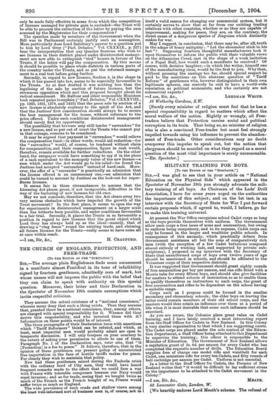go THE EDITOR OF THE "SPECTATOR.1 SIR,—The average plain Englishman
finds some amusement in a manifesto almost Pontifical in its tone of infallibility signed by fourteen gentlemen, admittedly men of mark, but whose names will not impress the public with the belief that they can claim to speak with authority on this special question. Moreover, their letter and their Declaration in the Spectator of November 19th contain assumptions which
invite respectful criticism.
They assume the actual existence of a "national conscience," whereas many deny that such a thing exists. Then they assume that, granted there be a national conscience, they, among others, are charged with special responsibility for it. Whence did they derive this responsibility, and who invested them with it ? Information on these points would be of interest. The three paragraphs of their Declaration teem with assertions which "Tariff Reformers" think can be refuted, and which, at least, most impartial men would probably admit are open to temperate discussion. I will only trespass on your courtesy to the extent of asking your permission to allude to one of them. Paragraph No. 1 of the Declaration says, inter alio, that "it [Protection] is a foe to peace." It follows, therefore, that in the opinion of these gentlemen our present policy of unrestricted free importation in the face of hostile tariffs makes for peace. For clearly they wish to maintain that policy.
Now had these gentlemen mixed during the Fashoda crisis with the ordinary herd of City men, they would have heard frequent remarks made to the effect that we could face a war with France with tolerable composure because our Navy would repel invasion; and as for trade, seeing that we bought twice as much of the French as the French bought of us, France would suffer twice as much as England.
The wide prevalence of such crude and shallow views among the least well-informed sort of business men is, of course, not in
itself a valid reason for changing our commercial system, but it certainly serves to show that so far from our existing trading relations with other countries, whether or no they are capable of improvement, making for peace, they are, on the contrary, the direct cause of a dangerous species of Jingoism which distinctly makes for war.
May I suggest, in conclusion, that there may be, after all, truth in the adage of hoary antiquity : "Let the shoemaker sticic to his last " ? Supposing fourteen thoughtful manufacturers took it upon themselves to inform the public with their valuable views on the Athanasian Creed, cast in the shape of a weak imitation of a Papal Bull, how would such a manifesto be received ? Of course, with derisive laughter,—in which the writer, himself one of the manufacturing class, would be the first to join. Why then, without pressing the analogy too far, should special respect be paid to the assertions on this abstruse question of "Tariff Reform" of gentlemen who, however distinguished in their own legitimate spheres, can scarcely be said to have a world-wide reputation as political economists, and who certainly are not commercial experts ?
16 Wetherby Gardens, S.W.
[Surely every minister of religion must feel that he has a special responsibility in regard to matters which affect the moral welfare of the nation. Rightly or wrongly, all Free- traders believe that Protection carries social and political corruption in its train. That being so, no minister of religion who is also a convinced Free-trader but must feel strongly impelled towards using his influence to prevent the abandon- ment of Free-trade. Other considerations may no doubt overpower this impulse to speak out, but the notion that clergymen should be muzzled on what they regard as a moral question of the most vital importance is surely unreasonable. —En. Spectator.]
MILITARY TRAINING FOR BOYS.






































































 Previous page
Previous page